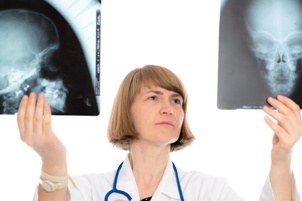 Basilar skull fractures, also known as basal skull fractures or base-of-skull fractures, are not a common injury. However, this type of skull fracture can lead to significant accident-related expenses for car accident victims. If you’ve suffered a basilar skull fracture or lost a loved one to this type of injury, you should contact an attorney immediately to learn how to protect your right to compensation.
Basilar skull fractures, also known as basal skull fractures or base-of-skull fractures, are not a common injury. However, this type of skull fracture can lead to significant accident-related expenses for car accident victims. If you’ve suffered a basilar skull fracture or lost a loved one to this type of injury, you should contact an attorney immediately to learn how to protect your right to compensation.
About Basilar Skull Fractures
Basilar skull fractures occur when the skull strikes a hard object with great force. Car accidents, along with falls and assaults, are the most common causes of this type of head injury. In a car accident, the force of being ejected from a vehicle or slamming through the windshield is often the cause of a basilar skull fracture.
Basilar skull fractures can happen in three areas of the skull:
- Temporal (sides of the skull)
- Occipital (back of the head)
- Clivus (an internal bony part of the skull behind the nasal cavity)
In about 75% of all cases, a patient with a basilar skull fracture has a temporal fracture.
Basilar skull fractures are considered the most serious type of skull fracture. The basal areas of the skull provide vital protection to the brain, the top of the spinal column, and the vascular structures running through the area.
Symptoms of a Basilar Skull Fracture
There are three well-known signs of a basilar skull fracture:
- Battle’s sign. This is deep bruising below the ears on the back of the skull.
- Halo sign. This occurs when the patient has blood and cerebrospinal fluid leaking from the ear. The mixture makes a distinctive ring pattern as it flows.
- Raccoon eyes. This refers to deep bruising around the sockets of both eyes.
Facial muscle weakness, balance problems, dizziness, ringing in the ears, visual difficulties, and nasal leakage can also be associated with this type of skull fracture.
Diagnosis and Possible Treatments
The unique symptoms associated with a basilar skull fracture typically make this a straightforward injury to diagnose. However, imaging tests such as X-rays, CT scans, or MRIs are used to confirm the diagnosis and evaluate the extent of the damage.
Surgery may be necessary to repair the fracture. Other associated injuries—including damage to the zygomatic arch, jugular vein, carotid artery, cranial nerves, and the bones of the ear and eardrum—may require surgery as well.
Patients with this type of skull fracture require close observation to prevent complications such as the development of meningitis. When the bones of the skull are broken, bacteria from the nose and mouth can move into the brain. This creates a potentially deadly infection.
The damage associated with a basilar skull fracture can create a number of long-term problems. For example, damage to blood vessels and nerves can lead to brain damage that creates a permanent impairment in cognitive function. Changes to fine motor skills, hearing, vision, speech, and sense of taste are also possible.
The most severe basilar skull fractures can be fatal.
The Value of Legal Representation
If you’ve suffered a basilar skull fracture in a car accident caused by another person’s negligence, you’re entitled to compensation for medical expenses, lost wages, and pain and suffering. If you’ve lost a loved one due to this type of injury, you may be eligible to file a wrongful death claim seeking compensation for the following: medical expenses up to the time of death, lost future earnings, reasonable funeral and burial costs, the deceased person’s pain and suffering, and the family’s loss of the deceased person’s care and companionship.
Personal injury and wrongful death claims involving basilar skull fractures can lead to substantial settlements, which is why insurance companies are in no hurry to settle this type of case. You can protect yourself by hiring an experienced attorney to advocate for the highest possible compensation on your behalf.
The legal team at Gray & White Law is committed to protecting the rights of Kentucky residents who’ve suffered serious car accident injuries. Contact us today to schedule a free, no-obligation initial consultation.
Related Links: